Young People and Sustainability: Angelini Industries' 2025 Observatory
Share
Digital natives and sustainable natives: these are young people under 30, members of the so-called Generation Z.
Increasingly informed about environmental and social issues, young people recognize the close interconnection between the health of the planet, social well-being, and individual mental and physical health and firmly believe that individual commitment can contribute to real change.
These and many other conclusions were drawn from the second edition of "Versione Gen Z: Osservatorio sui Giovani e la Sostenibilità" (Gen Z Version: Observatory on Young People and Sustainability).
Introduction
The Observatory on Young People and Sustainability is an initiative promoted by Angelini Industries with the aim of monitoring the evolution of Generation Z's expectations, behaviors, and in relation to constantly changing environmental, social, and geopolitical issues over time.
The survey, conducted for the first time in 2024 by Quorum/YouTrend and CSA Research, investigates the relationship between Generation Z and sustainability: the second edition of the Observatory, launched in 2025, provided further insight by giving voice to the needs of young adults on the topic of "one health."
The 2025 survey explores how Generation Z perceives the relationship between sustainability and well-being within a holistic concept of 'one health'; an approach that unites and integrates different disciplines and considers the health of people, environmental protection and social well-being as interrelated.
Panel characteristics
The survey was conducted on a panel of 4,000 people, including 600 individuals aged under 30 representative of Generation Z and the millennials, who were involved through C.A.W.I. interviews and qualitative insights.
The questions addressed to the respondents were designed to explore sustainability through three different interpretive dimensions, helping to understand how this concept is perceived and experienced:
- Macro level: dedicated to analyzing general perceptions and meanings attributed to the term "sustainability" in the current context;
- Meso level: focused on the relationship between sustainability, territory, community, and emotional ties, i.e., how it is reflected in social relationships and everyday life contexts;
- Micro level: centered on the personal dimension, which considers sustainability as an integral part of individual well-being.
Sustainability according to Gen Z
Generation Z attributes a wide and varied range of meanings to sustainability, many of which are strongly linked to the environmental dimension. 58.9% of young adults (compared to 50.8% of the rest of the sample) interpret sustainability as the need to reduce the environmental impact of human activities. In addition, 50.6% of those in this age group (compared to 37.4% of the general population) associate it with the development of renewable energy and moving away from fossil fuels. Consistent with this view, 38% of under-30s recognize the circular economy - a model that minimizes waste through recycling and material regeneration as a concrete tool for promoting environmental sustainability.
In addition to the environment, young people feel a strong connection between sustainability, social issues, and health: 34.9% of respondents aged between 16 and 30 believe that action should be taken to promote environmental protection and social well-being together (compared to 26.3% of older respondents), and 35.9% of them associate sustainability with caring for future generations (compared to 24.2% of the rest of the panel). Furthermore, 26.8% of young adults (compared to 17.7% of those over 30) think that being sustainable means preventing and reducing risks, not only environmental but also economic, health, and social.
The issue of 'responsibility'
Despite an increase in the percentage of young people who are disillusioned (45% compared to 34% in the previous year) and convinced that the Sustainable Development Goals will not be achieved due to irreversible environmental degradation, the majority of the new generation (55%) continues to believe that these goals can radically transform our way of life. In this scenario, the role of individual actions remains central: 82.2% of Gen Z members (compared to 79.3% of the rest of the sample) believe that their daily contribution can make a difference.
This conviction translates into concrete behaviors, ranging from neo-frugality to responsible activism: 55.3% say they sort their waste accurately (+3.4% compared to 2024), 38% are committed to reducing their water consumption (+7%), and 28.8% have taken drastic measures to reduce their household energy consumption (+7.8%), such as giving up air conditioning or keeping the temperature lower in winter. Finally, 24.5% (+8.3%) have chosen to stop using private cars, preferring public transport or bicycles.
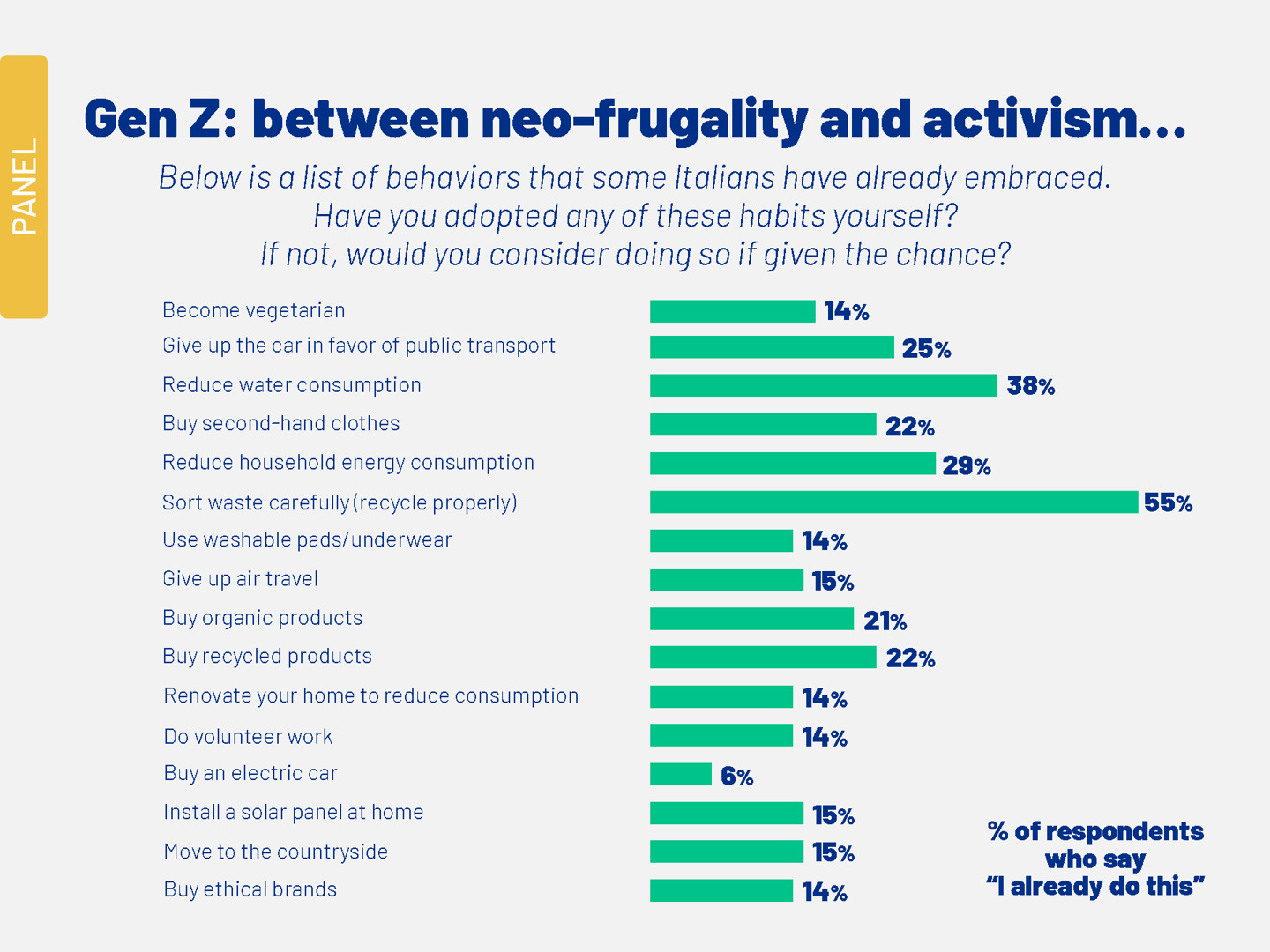
Approach to consumption
Consumption choices are also influenced by these perceptions: 22.3% of Gen Zers buy second-hand clothes, and 79.6% (compared to 70.8% of the rest of the study group) say that, given the same price and quality, they would be willing to replace their favorite brand with one that is more sustainable from an environmental, economic, and social point of view. Furthermore, 60% of young adults (compared to 46.5% of the general population) say they are willing to make this choice even if the product is more expensive.
Confirming this growing ethical awareness, 51% of the new generation say they have already boycotted at least one company they consider socially unfair or dangerous, compared to 40% of the rest of the sample.
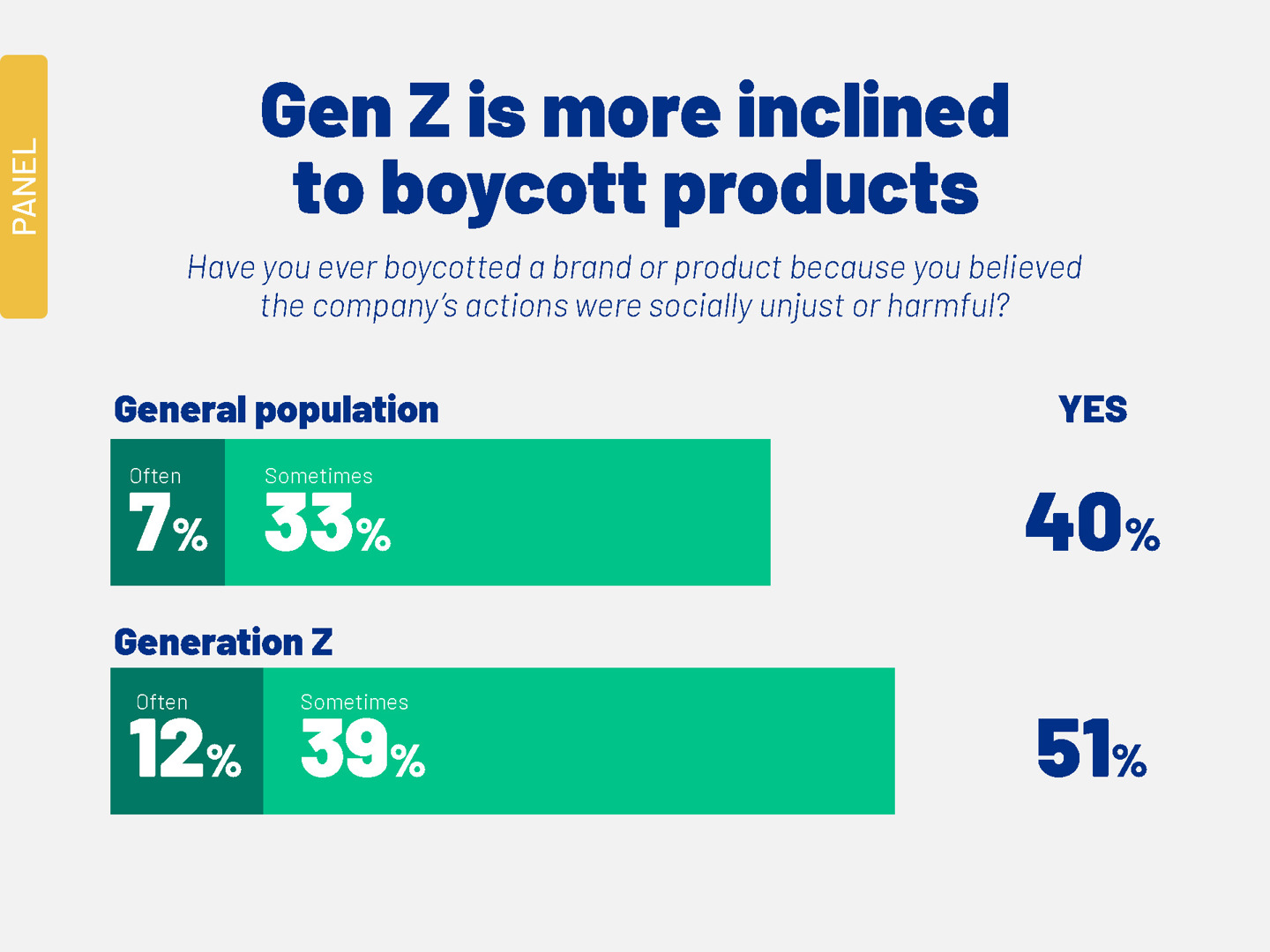
“One Health”
Gen Z has a particularly strong connection between environmental issues and health: 91.1% of young people (compared to 86.4% of the rest of the survey participants) believe that the environmental crisis is already having a real impact on health. In particular, the level of satisfaction with psychological well-being is lower among Gen Z than among the over-30s: only 22.9% of respondents say they enjoy optimal mental health, and just one in five say they have no psychological problems, compared with 35.9% of the more mature age groups.
Another interesting finding concerns the perception of responsibility for mental health: while recognizing family and friends as the main points of reference in case of difficulty, young people believe that the main responsibility lies with the state (37.2%) and the community (32.7%), rather than with the individual (22.4%).
This aspect introduces the concept of 'One Health', an approach that brings together different disciplines and considers people's health, environmental protection and social well-being as interrelated. Although most under-30s were unfamiliar with the term, over 54% of them gave the correct definition from those proposed in the survey.
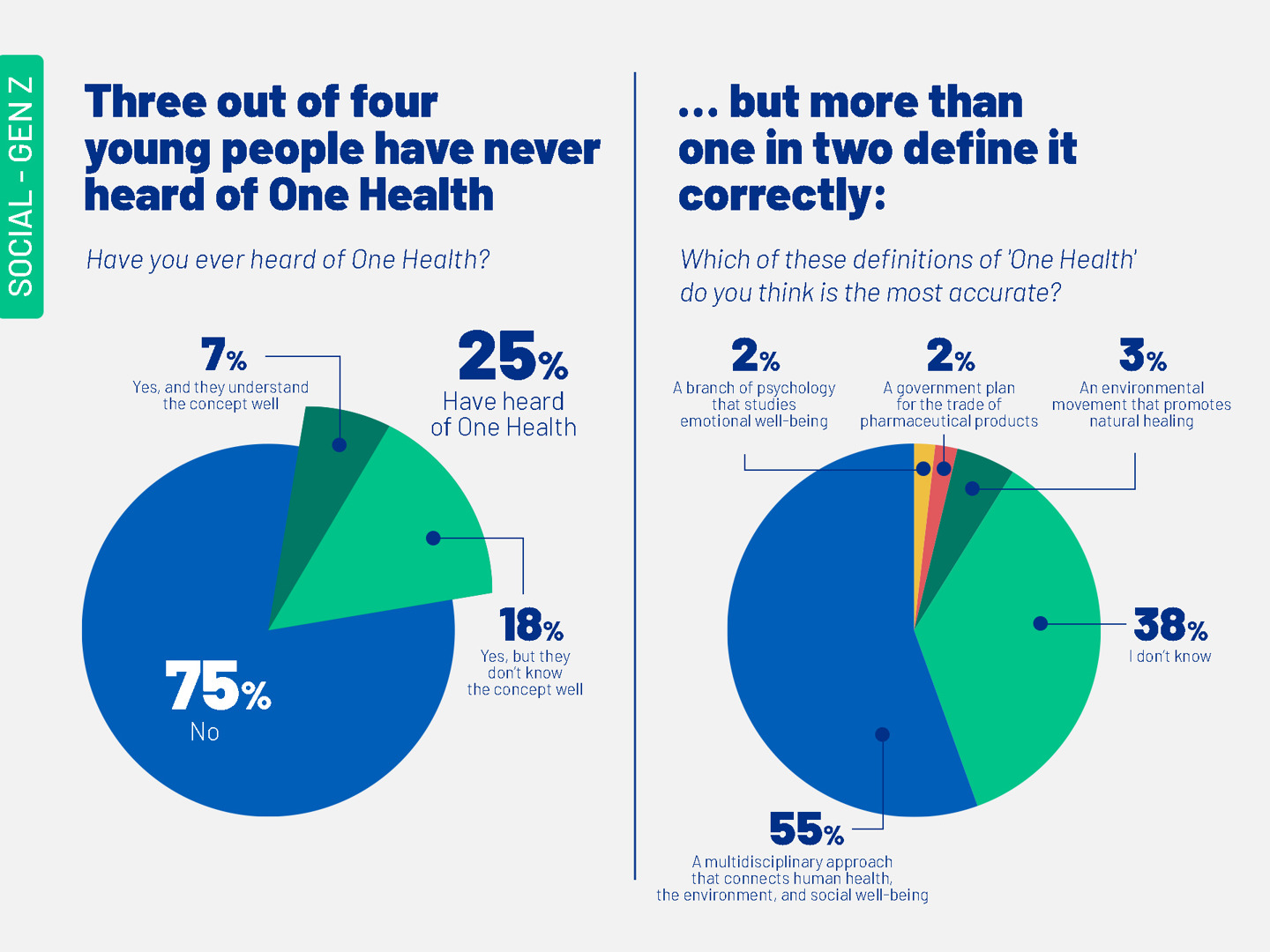
Once informed about the exact meaning of the expression, the young people surveyed identified mental health as its most important element (81.5%), followed by other fundamental aspects of "overall health" such as physical health (73%), social well-being of the community (66%), and ecosystem balance (66%).
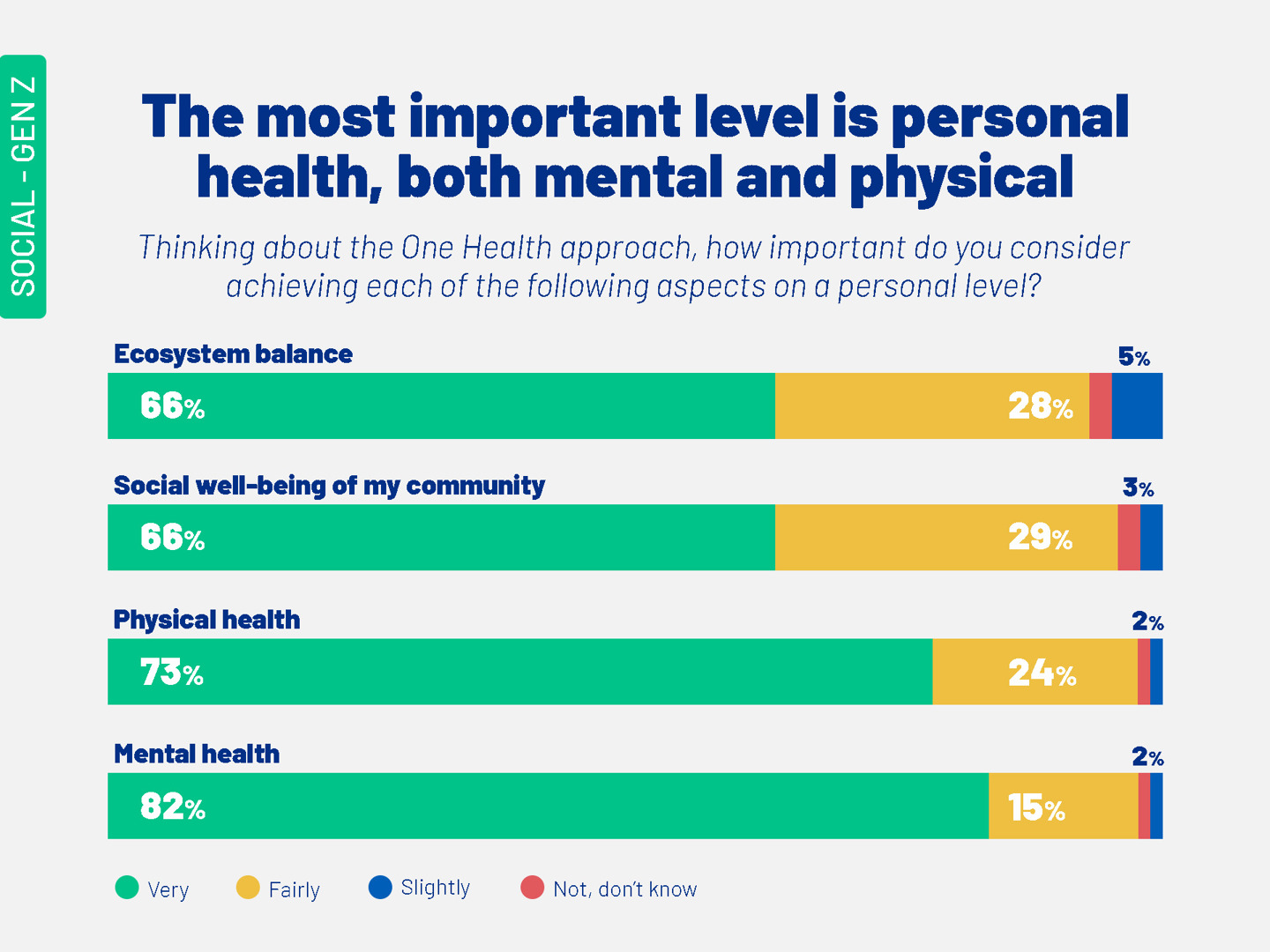
Perception of the future
Looking to the future, 40% of Gen Zers believe in the value of individual contributions to improving current social conditions. For this reason, they expect a stronger push for sustainability from their own generation (40.6%), followed by politicians and world leaders (36.8%), large companies (34.1%) and, to a lesser extent, collaboration between the latter and governments (28.7%).
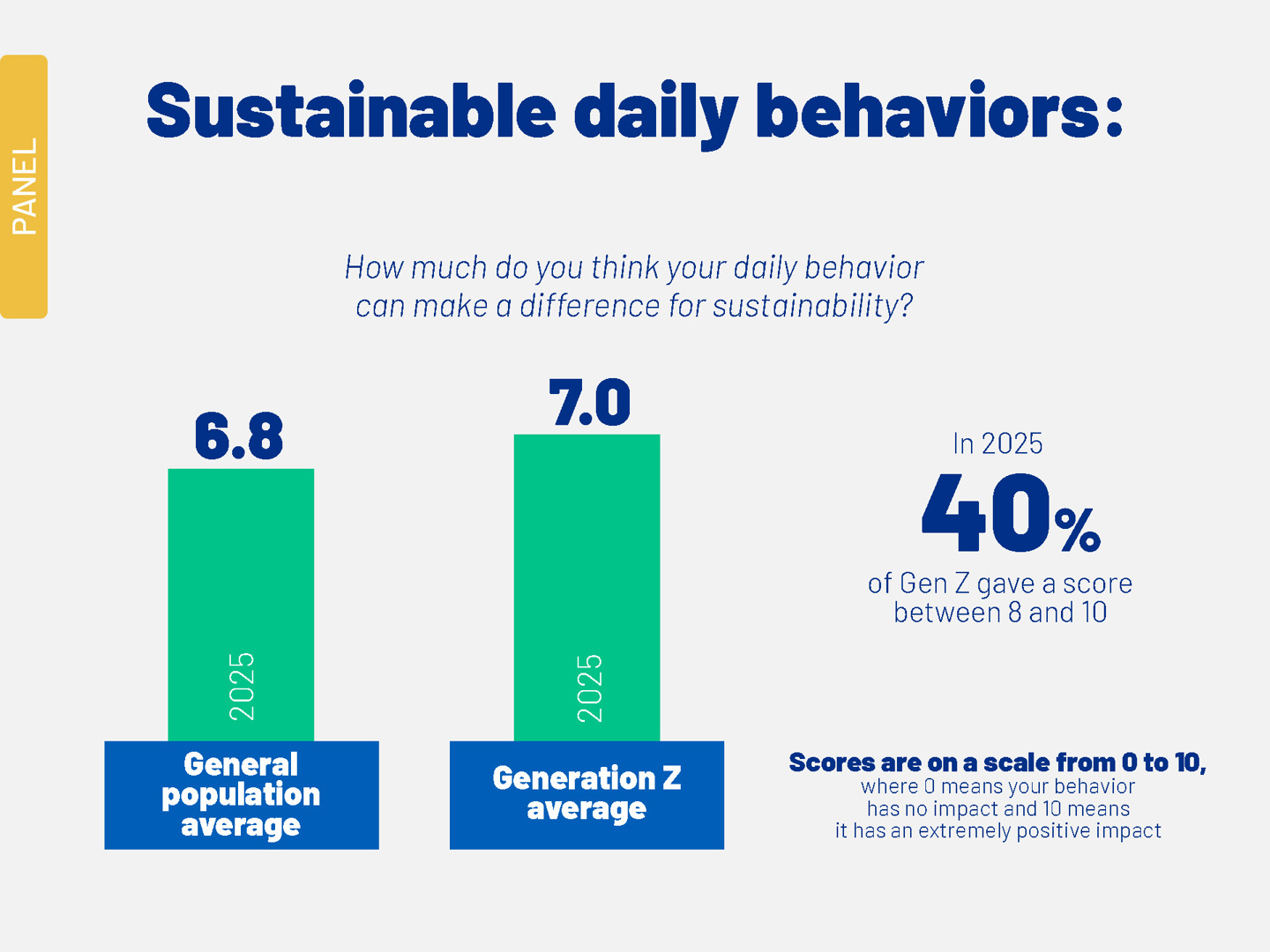
Gen Z profile: listening to take action
The Observatory's data paints a clear picture of Generation Z: informed and aware individuals with an integrated approach to sustainability that is reflected in their daily choices and responsible, thoughtful consumption. This is a strong signal for companies, because young people are not only today's new consumers, but will also be increasingly influential in the future. For organizations, it is not just a matter of identifying new purchasing habits, but also of rethinking their employer branding strategies: to attract and retain new talent, companies must consistently demonstrate their commitment to sustainability by adopting concrete policies focused on people's well-being.
 Angelini Industries
Angelini Industries





